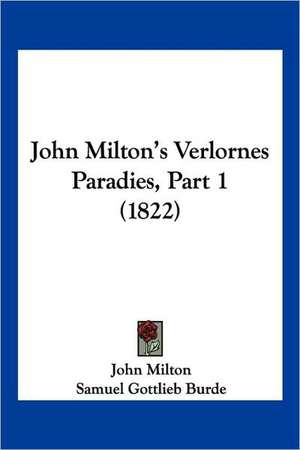John Milton's Verlornes Paradies, Part 1 (1822)
Autor John Milton Editat de Samuel Gottlieb Burdede Limba Germană Paperback – 9 aug 2009
Preț: 177.16 lei
Nou
Puncte Express: 266
Preț estimativ în valută:
33.90€ • 35.27$ • 27.99£
33.90€ • 35.27$ • 27.99£
Carte disponibilă
Livrare economică 20-26 martie
Livrare express 07-13 martie pentru 26.44 lei
Preluare comenzi: 021 569.72.76
Specificații
ISBN-13: 9781104874223
ISBN-10: 1104874229
Pagini: 274
Dimensiuni: 152 x 229 x 15 mm
Greutate: 0.4 kg
Editura: Kessinger Publishing
ISBN-10: 1104874229
Pagini: 274
Dimensiuni: 152 x 229 x 15 mm
Greutate: 0.4 kg
Editura: Kessinger Publishing
Notă biografică
John Milton (9 December 1608 - 8 November 1674) was an English poet and intellectual, who served as a civil servant for the Commonwealth of England under its Council of State and later under Oliver Cromwell. He wrote at a time of religious flux and political upheaval, and is best known for his epic poem Paradise Lost (1667). Writing in English, Latin, Greek, and Italian, he achieved international renown within his lifetime, and his celebrated Areopagitica (1644), written in condemnation of pre-publication censorship, is among history's most influential and impassioned defences of freedom of speech and freedom of the press. His desire for freedom extended into his style: he introduced new words (coined from Latin) to the English language, and was the first modern writer to employ non-rhymed verse outside of the theatre or translations. William Hayley's 1796 biography called him the greatest English author, and he remains generally regarded as one of the preeminent writers in the English language, though critical reception has oscillated in the centuries since his death (often on account of his republicanism). Samuel Johnson praised Paradise Lost as "a poem which...with respect to design may claim the first place, and with respect to performance, the second, among the productions of the human mind," though he (a Tory and recipient of royal patronage) described Milton's politics as those of an "acrimonious and surly republican." Poets such as William Blake, William Wordsworth and Thomas Hardy revered him.
